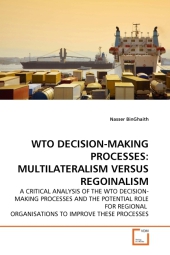 Neuerscheinungen 2010Stand: 2020-01-07 |
Schnellsuche
ISBN/Stichwort/Autor
|
Herderstraße 10
10625 Berlin
Tel.: 030 315 714 16
Fax 030 315 714 14
info@buchspektrum.de |

Nasser BinGhaith
WTO DECISION-MAKING PROCESSES: MULTILATERALISM VERSUS REGOINALISM
A CRITICAL ANALYSIS OF THE WTO DECISION-MAKING PROCESSES AND THE POTENTIAL ROLE FOR REGIONAL ORGANISATIONS TO IMPROVE THESE PROCESSES
2010. 316 S.
Verlag/Jahr: VDM VERLAG DR. MÜLLER 2010
ISBN: 3-639-29680-X (363929680X)
Neue ISBN: 978-3-639-29680-8 (9783639296808)
Preis und Lieferzeit: Bitte klicken
This book is very useful for those who want to know what the World Trade Organization is all about. It provides a third world country´s view of international organizations in general and economic international organization in partucular. The author adopted a new approach and angle in analyzing the collective decision-making process of World Trade Organization by constructing a four-element test (Inclusiveness-Efficiency- Transparency-Fairness). He successfully managed to pin down the main faults and paradoxes of the World Trade Organization´s institutional process namely the decision-making processes both formal and informal. The author also, with great level of success, managed to tackle this complex issue by putting forward a rather novel proposition suggesting that regionalism and multilateralism are two complementary rather than conflicting concepts. He argues that regional arrangements has a constructive role to play in the multilateral trading system and the world Trade Organization can benefit from regional organization by including them into its decision-making process and institutions.
Dr. Nasser A. BinGhaith, is Lawyer and Economist specialized in International Trade and Economic Blocs, Nasser believes that the World Trade Organization with its current decision-making processes will not be able to establish a sustainable rule-based world trading system necessary for international peace and security


